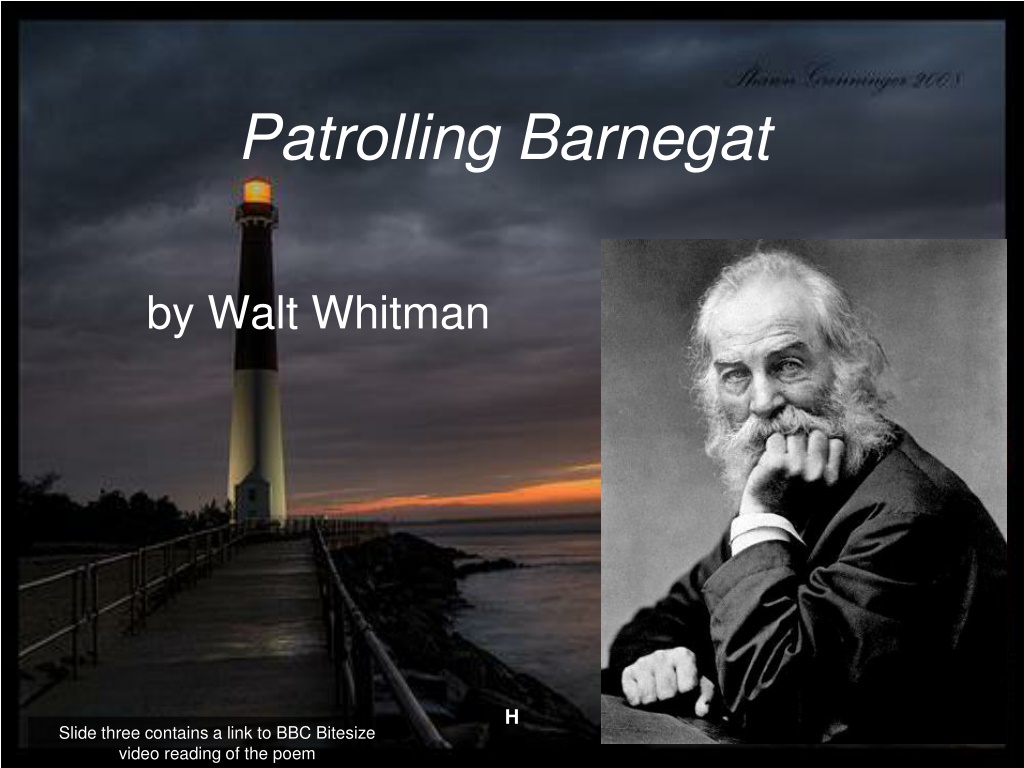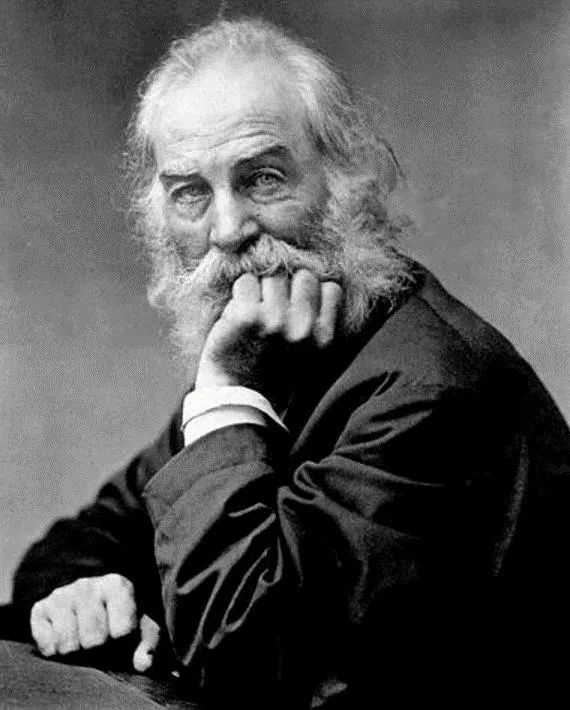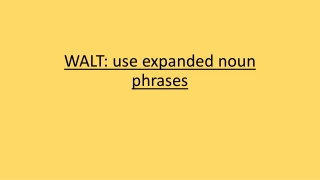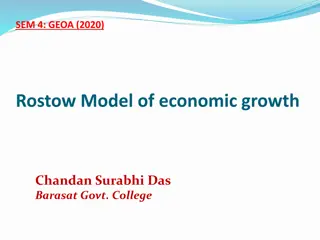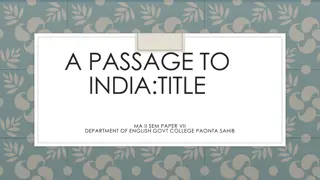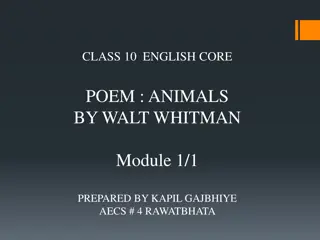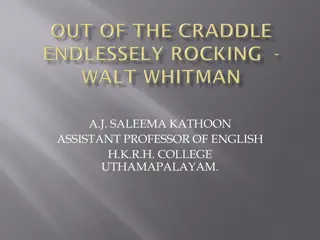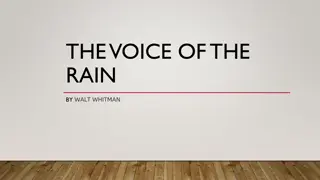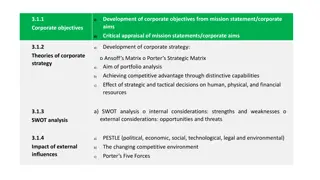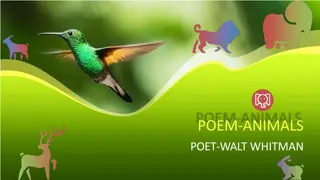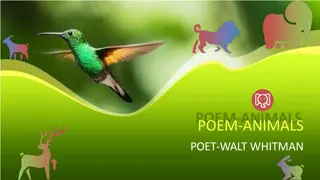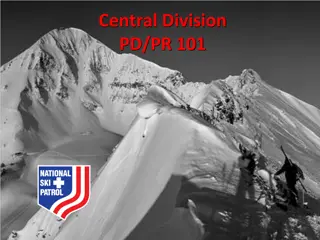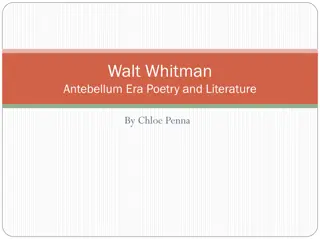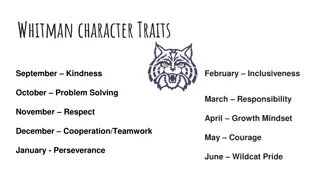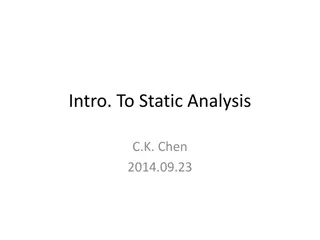Analysis of Walt Whitman's "Patrolling Barnegat
Walt Whitman's poem "Patrolling Barnegat" reflects the power of nature and the struggle of man against it. Set on a stormy night by the sea, the poem portrays vivid imagery with religious undertones, utilizing literary devices like alliteration and assonance to create a poignant reflection. Whitman's personal experiences during the Civil War likely influenced the themes of the poem, exploring the existential confrontation between human fragility and the relentless forces of nature.
Download Presentation

Please find below an Image/Link to download the presentation.
The content on the website is provided AS IS for your information and personal use only. It may not be sold, licensed, or shared on other websites without obtaining consent from the author.If you encounter any issues during the download, it is possible that the publisher has removed the file from their server.
You are allowed to download the files provided on this website for personal or commercial use, subject to the condition that they are used lawfully. All files are the property of their respective owners.
The content on the website is provided AS IS for your information and personal use only. It may not be sold, licensed, or shared on other websites without obtaining consent from the author.
E N D
Presentation Transcript
Patrolling Barnegat by Walt Whitman H Slide three contains a link to BBC Bitesize video reading of the poem
Walt Whitman Walt Whitman lived from 1819 to 1892. He worked as a printer, teacher and property speculator He wrote the poem in 1880 whilst living near Barnegat (now called Ocean County) a feeling or ambition to articulate and faithfully express in poetic form my own physical, emotional, moral, intellectual and aesthetic personality During the Civil War (1861 - 1865) he volunteered to work in a hospital amongst the wounded H
Patrolling Barnegat Themes Personal reflection Natural power Vs Man Storms Key terms: Present participle End-stopping Vivid imagery Religious imagery Anthropomorphism Alliteration Assonance Sibilance H
Patrolling Barnegat Wild, wild the storm, and the sea high running Steady the roar of the gale, with incessant undertone muttering, Three: This is also links to the Holy Trinity Shouts of demoniac laughter fitfully piercing and pealing, Waves, air, midnight, their savagest trinity lashing, Out in the shadows there milk-white combs careering, On beachy slush and sand spirts of snow fierce slanting, Waves Where through the murk the easterly death-wind breasting, Through cutting swirl and spray watchful and firm advancing, (That in the distance! is that a wreck? is the red signal flaring?) Leaving/ Going Slush and sand of the beach tireless till daylight wending, Steadily, slowly, through hoarse roar never remitting, Along the midnight edge by those milk-white combs careering, A group of dim, weird forms, struggling, the night confronting, That savage trinity warily watching. H
Someone, presumably the poet, is walking alone along the beach through driving snow, looking out to sea across the wild waves. The poem is set on a beach on a stormy, wintry night Wild, wild the storm, and the sea high running Steady the roar of the gale, with incessant undertone muttering, Shouts of demoniac laughter fitfully piercing and pealing, Waves, air, midnight, their savagest trinity lashing, Out in the shadows there milk-white combs careering, On beachy slush and sand spirts of snow fierce slanting, Where through the murk the easterly death-wind breasting, Through cutting swirl and spray watchful and firm advancing, (That in the distance! is that a wreck? is the red signal flaring?) Slush and sand of the beach tireless till daylight wending, Steadily, slowly, through hoarse roar never remitting, Along the midnight edge by those milk-white combs careering, A group of dim, weird forms, struggling, the night confronting, That savage trinity warily watching. Through the dark, snow and spray he is not quite sure what he sees - possibly a shipwreck, and a distress signal - then what seems to be a group of walkers, braving the storm. H
However, if it was it would be interesting that a form usually reserved for love is used for something wild, confusing and chaotic. Some people claim this is a sonnet because it is fourteen lines long; it is not! A bit like love! Wild, wild the storm, and the sea high running Steady the roar of the gale, with incessant undertone muttering, Shouts of demoniac laughter fitfully piercing and pealing, Waves, air, midnight, their savagest trinity lashing, Out in the shadows there milk-white combs careering, On beachy slush and sand spirts of snow fierce slanting, Where through the murk the easterly death-wind breasting, Through cutting swirl and spray watchful and firm advancing, (That in the distance! is that a wreck? is the red signal flaring?) Slush and sand of the beach tireless till daylight wending, Steadily, slowly, through hoarse roar never remitting, Along the midnight edge by those milk-white combs careering, A group of dim, weird forms, struggling, the night confronting, That savage trinity warily watching. -ing ending is unstressed in English which gives each line more of an eerie echoing quality rather than a rhyme H
Patrolling Barnegat Who is the enemy? Nature? The storm? Sets a military tone from the start. What does this imply about what s to come? Wild, wild the storm, and the sea high running Steady the roar of the gale, with incessant undertone muttering, Shouts of demoniac laughter fitfully piercing and pealing, Waves, air, midnight, their savagest trinity lashing, Out in the shadows there milk-white combs careering, On beachy slush and sand spirts of snow fierce slanting, Where through the murk the easterly death-wind breasting, Through cutting swirl and spray watchful and firm advancing, (That in the distance! is that a wreck? is the red signal flaring?) Slush and sand of the beach tireless till daylight wending, Steadily, slowly, through hoarse roar never remitting, Along the midnight edge by those milk-white combs careering, A group of dim, weird forms, struggling, the night confronting, That savage trinity warily watching. -ing present participle gives a sense of immediacy to events as if they re happening around the speaker. In fact there is no main verb in the poem! Why has Whitman done this? H
This could be seen as allowing the reader to experience the storm as it verbally blows you along without respite Wild, wild the storm, and the sea high running Steady the roar of the gale, with incessant undertone muttering, Shouts of demoniac laughter fitfully piercing and pealing, Waves, air, midnight, their savagest trinity lashing, Out in the shadows there milk-white combs careering, On beachy slush and sand spirts of snow fierce slanting, Where through the murk the easterly death-wind breasting, Through cutting swirl and spray watchful and firm advancing, (That in the distance! is that a wreck? is the red signal flaring?) Slush and sand of the beach tireless till daylight wending, Steadily, slowly, through hoarse roar never remitting, Along the midnight edge by those milk-white combs careering, A group of dim, weird forms, struggling, the night confronting, That savage trinity warily watching. Only End-stopped on the last line giving the poem a breathless quality; it s difficult to read because we are allowed only short pauses at the commas H
These conditions are fearfully described and create the conditions in which we can not answer the questions posed Wild, wild the storm, and the sea high running Steady the roar of the gale, with incessant undertone muttering, Shouts of demoniac laughter fitfully piercing and pealing, Waves, air, midnight, their savagest trinity lashing, Out in the shadows there milk-white combs careering, On beachy slush and sand spirts of snow fierce slanting, Where through the murk the easterly death-wind breasting, Through cutting swirl and spray watchful and firm advancing, (That in the distance! is that a wreck? is the red signal flaring?) Slush and sand of the beach tireless till daylight wending, Steadily, slowly, through hoarse roar never remitting, Along the midnight edge by those milk-white combs careering, A group of dim, weird forms, struggling, the night confronting, That savage trinity warily watching. Things are unclear, murky . The poet poses questions that are never answered. How does this emphasise the conditions in the storm? H
Repeated phrase gives the impression of the incessant, repeated battering of the waves Wild, wild the storm, and the sea high running Steady the roar of the gale, with incessant undertone muttering, Shouts of demoniac laughter fitfully piercing and pealing, Waves, air, midnight, their savagest trinity lashing, Out in the shadows there milk-white combs careering, On beachy slush and sand spirts of snow fierce slanting, Where through the murk the easterly death-wind breasting, Through cutting swirl and spray watchful and firm advancing, (That in the distance! is that a wreck? is the red signal flaring?) Slush and sand of the beach tireless till daylight wending, Steadily, slowly, through hoarse roar never remitting, Along the midnight edge by those milk-white combs careering, A group of dim, weird forms, struggling, the night confronting, That savage trinity warily watching. Sets the tone of the poem straight away Look at the length of the lines (number of syllables): they appear to ebb and flow in the same way as the storm and the last line is one of the shortest perhaps suggesting the lack of resolution in the speaker s observations H
Alliteration, assonance and sibilance are used by Whitman to evoke the sounds of the storm and the sea for the reader Wild, wild the storm, and the sea high running Steady the roar of the gale, with incessant undertone muttering, Shouts of demoniac laughter fitfully piercing and pealing, Waves, air, midnight, their savagest trinity lashing, Out in the shadows there milk-white combs careering, On beachy slush and sand spirts of snow fierce slanting, Where through the murk the easterly death-wind breasting, Through cutting swirl and spray watchful and firm advancing, (That in the distance! is that a wreck? is the red signal flaring?) Slush and sand of the beach tireless till daylight wending, Steadily, slowly, through hoarse roar never remitting, Along the midnight edge by those milk-white combs careering, A group of dim, weird forms, struggling, the night confronting, That savage trinity warily watching. H
Either way it makes nature sound alive and malicious or evil Anthropomorphism Whitman gives the storm human characteristics. What effect does this have on the reader? Wild, wild the storm, and the sea high running Steady the roar of the gale, with incessant undertone muttering, Shouts of demoniac laughter fitfully piercing and pealing, Waves, air, midnight, their savagest trinity lashing, Out in the shadows there milk-white combs careering, On beachy slush and sand spirts of snow fierce slanting, Where through the murk the easterly death-wind breasting, Through cutting swirl and spray watchful and firm advancing, (That in the distance! is that a wreck? is the red signal flaring?) Slush and sand of the beach tireless till daylight wending, Steadily, slowly, through hoarse roar never remitting, Along the midnight edge by those milk-white combs careering, A group of dim, weird forms, struggling, the night confronting, That savage trinity warily watching. Is this man standing up to nature or nature over- powering man? Waves, air, midnight are contrasted with the notion of an unholy trinity of destructive natural power Given the human characteristics of the storm who is doing the patrolling? The dim, weird forms or the savage trinity H
What is the main mood/tone of this poem? Frightening? Amazing? Mysterious? Wild, wild the storm, and the sea high running Steady the roar of the gale, with incessant undertone muttering, Shouts of demoniac laughter fitfully piercing and pealing, Waves, air, midnight, their savagest trinity lashing, Out in the shadows there milk-white combs careering, On beachy slush and sand spirts of snow fierce slanting, Where through the murk the easterly death-wind breasting, Through cutting swirl and spray watchful and firm advancing, (That in the distance! is that a wreck? is the red signal flaring?) Slush and sand of the beach tireless till daylight wending, Steadily, slowly, through hoarse roar never remitting, Along the midnight edge by those milk-white combs careering, A group of dim, weird forms, struggling, the night confronting, That savage trinity warily watching. Pick out quotations to support each view before making your mind up H
Comparisons Storm on the Island Heaney Both poems are from a personal viewpoint. Both poems are about a storm at sea. Yet Whitman is Patrolling the beach, almost participating in the storm, while Heaney is prepared, protected in his house. Heaney uses a simile - spits like a tamed cat turned savage - to describe the wild sea; Whitman uses images that are even more menacing, like Shouts of demoniac laughter. Heaney describes the wind attacking - we are bombarded by the empty air. Whitman uses another military image - that of troops moving forward, watchful and firm advancing - to describe the force of the wind. Both images portray the wind as the enemy. The Field Mouse Clarke Both poems are from a personal viewpoint, but ... Clarke writes about hidden dangers of haymaking on a summer's day, in contrast to Whitman's vivid portrayal of a beach during a winter storm. Mankind creates the danger in Clarke's poem - man drives the tractor that kills the mouse and man causes wars. However in Whitman's poem the powers in nature create the danger, and mankind is vulnerable. Clarke uses personification to illustrate the suffering caused by haymaking (and the war in Bosnia) - the field lies bleeding. Whitman also uses personification - the high sea running ... incessant undertone muttering - to suggest the hostility of the natural world. H
Comparisons Inversnaid G. M. Hopkins Both poems are from a personal viewpoint, but ... Hopkins writes about the beauties of Inversnaid, like the braes dappled with dew, as well as its dangers. The main danger in Inversnaid is the pool so pitchblack, fell-frowning. Whitman also uses alliteration to highlight dangers (piercing and pealing Whitman shows the relentlessness of the storm through the lack of full stops - perhaps to suggest that anything fixed and solid (like rules of grammar) are destroyed by the storm. In contrast, Hopkins uses a steadier rhythm, using rhyming couplets to suggest the fast pace of the rushing water. What other poems could we compare and why? H
Writing about poems What might you want to say about Whitman's depiction of stormy weather? H
The poem is a striking list of vivid impressions of a beach in a winter storm. It is not a complete sentence, but as if anything fixed and solid (like rules of grammar) are destroyed by the storm. Our expectations are deceived - we imagine that the poem will build up to a striking main verb to complete the sentence emphatically, but that doesn't happen - we are left on a cliff-hanger. The natural elements that are described using verbs normally applied to people or animals - the waves are careering, the wind breasting - which is disconcerting: the elements are somehow alive, and more powerful than humans. The reference to demoniac laughter even suggests the supernatural. The poet uses alliteration to heighten our sense of the storm. In line 6 he combines alliteration with consonance: On beachy slush and sand spirts of snow fierce slanting - which give the impression of the harsh, hissing, swirling snow. There is a lot of repetition in the poem and some near-repetition: for example, beachy slush and sand (line 6) is echoed by Slush and sand of the beach (line 10). Perhaps the reader feels bombarded by words as the poet did by the storm, as we are given the same image again and again. The poem ends on a sinister note: the savage trinity are still warily wathing and so we are left with the idea of an evil presence. We are haunted by the idea that the elements are stronger than man - and possibly threatening. H
